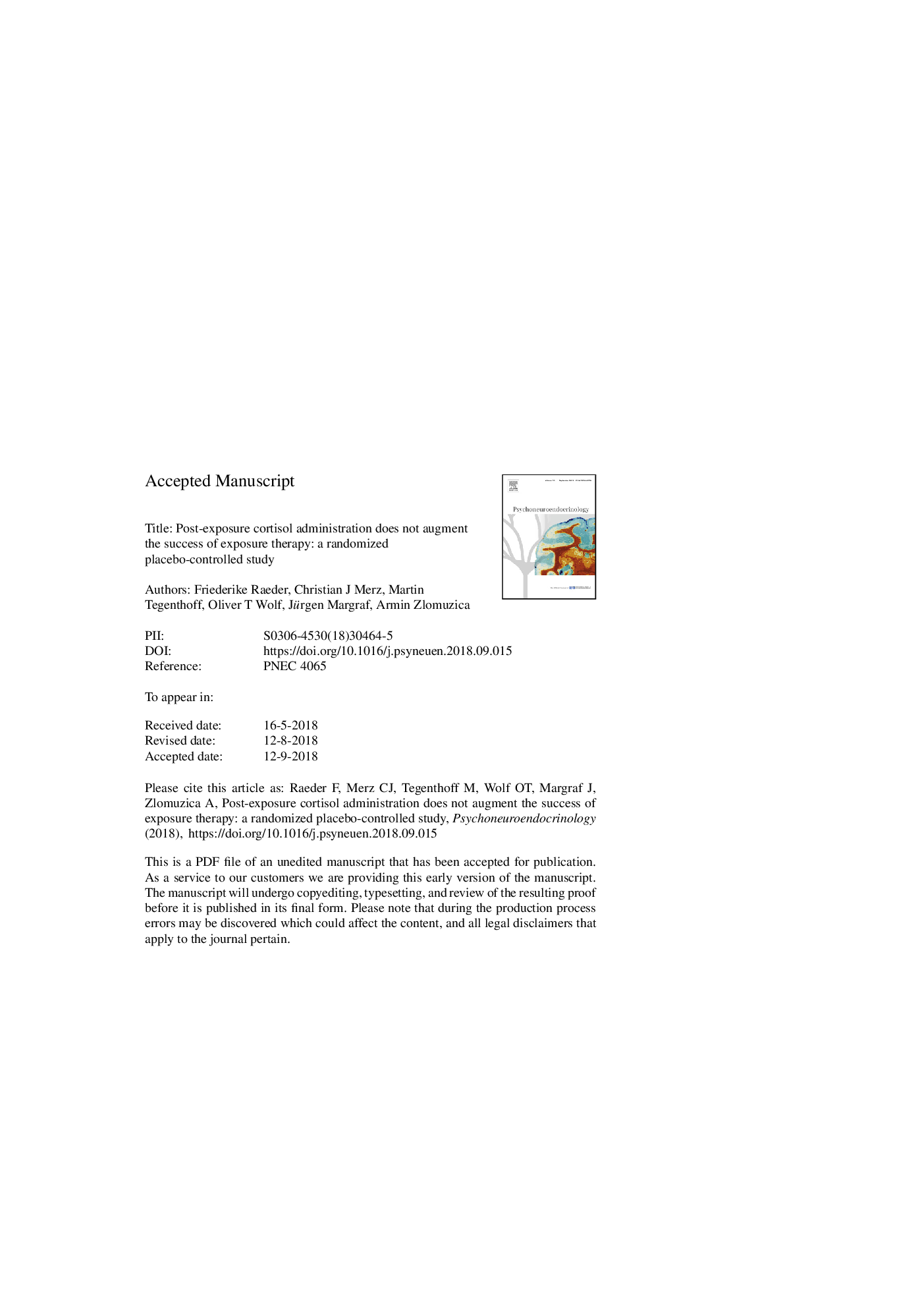| کد مقاله | کد نشریه | سال انتشار | مقاله انگلیسی | نسخه تمام متن |
|---|---|---|---|---|
| 11031660 | 1645942 | 2019 | 33 صفحه PDF | دانلود رایگان |
عنوان انگلیسی مقاله ISI
Post-exposure cortisol administration does not augment the success of exposure therapy: A randomized placebo-controlled study
ترجمه فارسی عنوان
تجویز کورتیزول پس از قرار گرفتن در معرض موفقیت درمان مواجهه را افزایش نمی دهد: یک مطالعه تصادفی کنترل شده با پلاسبو
دانلود مقاله + سفارش ترجمه
دانلود مقاله ISI انگلیسی
رایگان برای ایرانیان
کلمات کلیدی
اختلالات اضطرابی، تبهکاری عنکبوتی، ترس انقراض، درمان در معرض، کورتیزول،
موضوعات مرتبط
علوم زیستی و بیوفناوری
بیوشیمی، ژنتیک و زیست شناسی مولکولی
علوم غدد
چکیده انگلیسی
Cortisol administration prior to treatment can promote the efficacy of exposure-based treatments in specific phobia: cortisol has been proposed to reduce fear retrieval at the beginning of exposure and to enhance the acquisition and consolidation of corrective information learned during exposure. Whether cortisol exerts a beneficial therapeutic effect when given after exposure, e.g., by targeting the consolidation of new corrective information, has not been addressed so far to date. Here, we examined whether post-exposure cortisol administration promotes fear reduction and reduces return of fear following contextual change in specific phobia. Furthermore, the effect of cortisol on return of fear following contextual change (i.e., contextual renewal) was assessed. Patients with spider phobia (Nâ=â43) were treated with a single session of in-vivo exposure, followed by cortisol administration (20âmg hydrocortisone) in a double-blind, placebo-controlled study design. Return of fear was assessed with behavioral approach tests (BATs) in the familiar therapy context (versus a novel unfamiliar context) at one-month and seven-month follow-up assessment. Exposure was effective in reducing fear from pre-treatment to post-treatment (i.e., 24âh after exposure) on fear-related behavioral (approach behavior during the BAT), psychophysiological (heart rate during the BAT) and subjective (fear during the BAT, spider-fear related questionnaires) measures of therapeutic outcome, with no add-on benefit of cortisol administration. Cortisol had no effect on contextual renewal at one-month follow-up. However, in a subsample (N = 21) that returned to the seven-month follow-up, an adverse effect of cortisol on fear renewal was found, with cortisol-treated patients showing an increase in subjective fear at the final approach distance of the BAT from post-treatment to seven-month follow-up. These and previous findings underline the importance of considering the exact timing of cortisol application when used as an add-on treatment for extinction-based psychotherapy: post-exposure cortisol administration does not seem to be effective, but might promote fear renewal at the subjective level.
ناشر
Database: Elsevier - ScienceDirect (ساینس دایرکت)
Journal: Psychoneuroendocrinology - Volume 99, January 2019, Pages 174-182
Journal: Psychoneuroendocrinology - Volume 99, January 2019, Pages 174-182
نویسندگان
Friederike Raeder, Christian J. Merz, Martin Tegenthoff, Oliver T. Wolf, Jürgen Margraf, Armin Zlomuzica,
